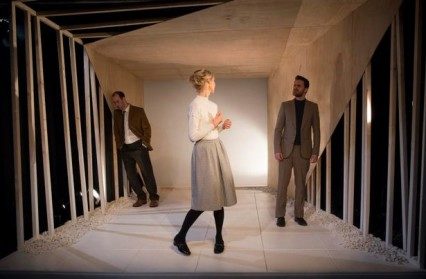Emily Garside was at The Other Room in Cardiff to review two plays, Play by Samuel Beckett and Silence by Harold Pinter for the start of their new season.
The Other Room launches into their new season in daring style, their second of original programming, after a winter season of collaborative productions. Pairing Samuel Beckett and Harold Pinter as an opening production is a strong choice. Such precision writing from such masters, words that are deceptively simple but powerfully effective, combined with similar simple staging that lets the words shine, is a brilliant and engaging combination. Precision of language and the uneasiness of love combine for a disquieting experience.
First is the surreal, fascinating Play, perhaps best known for the actors being encased in urns, only their heads visible. Highlighted by a spotlights, interrogation style, as they speak, the heads representing Man, wife and mistress, tell their story. What begins as both clichés and at times amusing recounting of an affair and its disintegration, quickly becomes something much darker when Beckett’s simple script instruction ‘Repeat Play’ is enacted. Stuck in an endless loop of dissecting, reliving, never progressing, only obsessing over the affair. The change in mood was clear from the audience, from the laughter that met the first round, to a heavy silence as the three remained stuck in their loop. A credit to the actors, given such limited space to ‘play’ with actually accentuates the power of Beckett’s frugal writing. All three (Matthew Bulgo, Victoria John and Peta Cornish) rise admirably to the challenge. The piece is accentuated by the brilliant design by Amy Jane Cook along with Katy Morrison’s lighting design, words may be at the centre of Beckett’s piece, but this team gave them a setting in which to shine.
The words are key in the companion piece, Pinter’s Silence. Given the similarities when placed side by side it’s surprising this is the first time they’ve been combined. Again an intricate web of subtleties of language, the play gives the cast – Matthew Bulgo and Peta Cornish returning, and joined by Neal McWilliams – plenty to play with. The set opens up to a beautiful diminishing perspective shape, which the actors move around, playing with their audiences’ perspective as Pinter’s intricate writing does the same. The characters often don’t speak to each other, they talk around each other, as if demonstrating their series of near misses as a collection of lovers. Similar to Play in this sense, they talk not quite to each other, not quite to the audience, almost to themselves letting the audience in on their thoughts and memories. In this trio of lovers there are missed moments and opportunities lost, the timelines of the narrative shifting and crossing so that audience and characters are never quite sure where they are. A more intricate set up than Play, and with scope to explore elements of the love affair from multiple points of view. This was in many ways a more difficult play to unpick but also a more intriguing one.
What ties these plays together is the mastery of language, the emphasis being on who said what, and how, and the bearing that has on a relationship, and a life course. Once again The Other Room is providing challenging, interesting theatre that audiences will be thinking about long after they leave.
The Other Room, Cardiff
Play by Samuel Beckett
Silence by Harold Pinter
Presented as a double bill.
Directed by Kate Wasserberg (Play) and Titas Halder (Silence)
To find out about upcoming productions from The Other Room visit their website.
Emily Garside is a regular contributor to Wales Arts Review.












